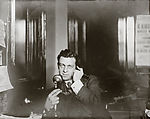
James Mallon was born in Manchester on 24th December 1874, of Irish Roman Catholic parents. His father, Felix Mallon was a mercantile clerk from County Tyrone. He died when James was only four. His mother Mary Ann (nee O'Hare) came from County Down. James had two sisters.
He attended a convent school in Liverpool, and on leaving was apprenticed to a jeweller. It was at this time he joined the Shop Assistants' Union, later becoming a member of the Union's executive council. He also studied at the Victoria University of Manchester, where he was drawn into what was to be the main focus of his life, that of social work with the under-privileged.
James joined the Independent Labour Party and the Fabian Society in 1903. In 1906 he moved from Manchester to Toynbee Hall, the Oxford Universities' settlement house in the East End of London. The Settlement Movement was founded by Samuel and Henrietta Barnett in 1884, with the support of Balliol and Wadham colleges. The radical idea behind Toynbee Hall was that middle class reformers would go to live in poor neighbourhoods, providing direct aid. As the founder said, " to learn as much as to teach, to receive as much as to give." It was here that James was appointed Secretary of the National League to Establish a Minimum Wage. In 1919 he was appointed warden of Toynbee Hall, an appointment that created some misgivings, because he was not an "Oxford man". It was soon discovered, however, that he was a "born committee man, conscientious, but with a welcome touch of conviviality, even irreverence."(Oxford Dictionary of National Biography-O.D.N.B.)
It was during the anti-sweating agitation that James became known to A.G. Gardiner, editor of the Daily News. In 1921 he married Gardiner's daughter, Stella Katherine. They had no children.
During World War One, James became a member of the Romney Street Group, a luncheon club of Labour sympathisers, founded by drama critic, Joseph Thorp. Another member of the group, Thomas Jones, who was deputy secretary to the cabinet, recommended James to Lloyd George, which in turn led to his appointment as a commissioner for industrial unrest, dealing with grievances of munitions workers.
James was an early member of the executive committee of the Workers' Educational Association, later becoming Honorary Treasurer. Educational and cultural interests mattered more to James than straight economics, although he did serve on Ramsay MacDonald's Economic Advisory Council. He also wrote booklets on the minimum wage and women's work, wrote articles for the Observer and Manchester Guardian, and published a book with E.C.T. Lascelles entitled "Poverty Yesterday and Today".
James was awarded an honorary doctorate from Liverpool University in 1944. In the same year he gave a "characteristically stimulating talk in Liverpool.... on the place of the pub in the community." (O.D.N.B).
During World War Two he advised Lord Walton on the provision of food and refreshment in London's air-raid shelters. He was largely responsible for the foundation of the Toynbee Hall Theatre, and in 1944 the Children's Theatre. From 1937 to 1939, and again from 1941 to 1946 he became a Governor of the British Broadcasting Company.
James had hoped to become a Labour M.P., but was unsuccessful. At Burslem in 1944 he said, "In this, and many other constituencies, I have been rejected by large and enthusiastic majorities." (O.D.N.B.) He was, however, appointed a Companion of Honour in 1939, for services of national importance, and in 1955 was awarded the Margaret McMillan medal, in recognition of his work for the underprivileged.
James died in St Mark's Hospital, London, on the 12th April 1961. His obituary in the "Times" said of him, "If ever there was a life single-heartedly devoted to the service of others, such a life was Mallon's."
| Reference: | 689 |
| Keywords: | |
| Archive Ref: | _DSC0578monoconv.jpg |
| Updated: | Thu 12 Jul 2007 - 1 |
| Interpretation written by | Barbara Harris |
| Author's organisation | |
| Organisation's website |